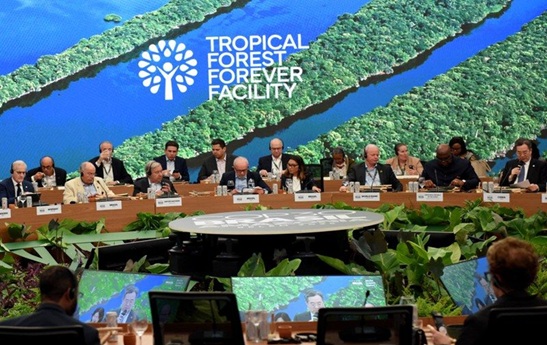(Prelims: Environment and Ecology; Current Affairs)
(Mains, General Studies Paper 3: Conservation, Environmental Pollution and Degradation, Environmental Impact Assessment) |
Context
Ahead of the Leaders Summit (COP 30) in Belém, Brazil, India announced its participation as an observer country in the Tropical Forests Forever Facility (TFFF).

About the Tropical Forests Forever Facility (TFFF)
What it is: The TFFF is a new global financial mechanism that aims to provide economic incentives to countries that protect their tropical forests.
Features
- It is a budget-neutral model, meaning there is no additional budgetary burden on governments.
- Under this initiative, countries will receive US$4 per hectare of protected forest land annually.
- The project will be managed by a TFFF Secretariat, while investment-related work will be handled through a Tropical Forest Investment Fund (TFIF).
- The TFIF will invest investors' seed money in environmentally friendly investments (such as green bonds, renewable energy) and return the money to investors from the profits generated.
Major Investor Countries and Contributions
|
Country
|
Contribution Amount
|
|
Brazil
|
US$ 1 billion
|
|
Indonesia
|
US$ 1 billion
|
|
Colombia
|
US$ 250 million
|
|
Norway
|
US$ 3 billion
|
|
Netherlands
|
US$ 5 million
|
|
Portugal
|
1 million euros
|
France, China, and the United Arab Emirates (UAE) have also supported the initiative. However, they have not yet announced their financial contributions.
Brazil's Climate Leadership Role
Brazilian President Luiz Inácio Lula da Silva appealed to world leaders on this occasion to:
- Develop a global roadmap to eliminate dependence on fossil fuels by 2030.
- Triple renewable energy capacity and double energy efficiency by 2030.
- He also supported debt-for-climate swaps to provide relief to developing countries.
He also launched a new initiative called the "Belém Commitment," which aims to quadruple the use of sustainable fuels by 2035.
India's Participation and Perspective
India's Ambassador to Brazil, Dinesh Bhatia, speaking on behalf of India, said that the TFFF is an important step in collective global action that will promote the conservation of tropical forests and the democratization of climate finance.
India's Climate Achievements:
- Between 2005 and 2020, India reduced its GDP emissions intensity by 36%.
- India's non-fossil fuel-based electricity capacity has now reached 50%. India achieved this target five years ahead of the 2030 target deadline.
- Between 2005 and 2021, India created an additional carbon sink capacity of 2.29 billion tonnes of CO₂ equivalent.
- India consistently emphasizes that affordable climate finance, technology transfer, and capacity building are essential for developing countries to meet their Nationally Determined Contributions (NDCs).
Global Relevance of TFFF
- Tropical forests are home to approximately 60% of the Earth's biodiversity and play a vital role in global carbon absorption capacity.
- Their destruction not only exacerbates climate imbalances but also impacts the livelihoods and ecosystems of local communities.
- TFFF encourages countries to conserve these forests by making them economically valuable.
Conclusion
The Tropical Forests Forever Facility (TFFF) is an excellent example of a financial incentive-based conservation model to combat climate change. India's participation in this initiative signals that the country is not only serious about its climate goals but also committed to playing global environmental leadership.



